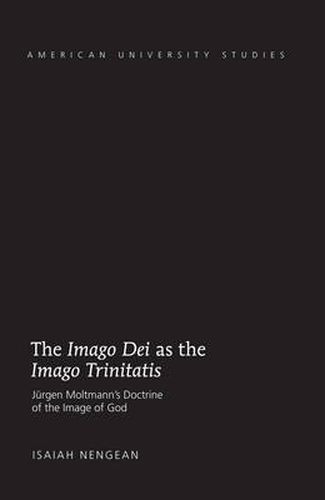Readings Newsletter
Become a Readings Member to make your shopping experience even easier.
Sign in or sign up for free!
You’re not far away from qualifying for FREE standard shipping within Australia
You’ve qualified for FREE standard shipping within Australia
The cart is loading…






This title is printed to order. This book may have been self-published. If so, we cannot guarantee the quality of the content. In the main most books will have gone through the editing process however some may not. We therefore suggest that you be aware of this before ordering this book. If in doubt check either the author or publisher’s details as we are unable to accept any returns unless they are faulty. Please contact us if you have any questions.
Jurgen Moltmann’s Doctrine of the Image of God examines the doctrine of the Image of God in the interpretation of contemporary theologian Jurgen Moltmann. A Reformed theologian from Germany, Moltmann espouses the doctrine in a way that creates a blurring of the Creator-creation distinction. This work identifies the problem with Moltmann’s formulation of the doctrine of the image of God as stemming from Moltmann’s rejection of classical theism or monotheism. He replaces it with the notion of transcendental immanence, together with Trinitarian pantheism, accentuated by means of Hegelian dialectics in alignment with Eastern Orthodox perspectives of the Trinity. Moltmann, therefore, makes the Trinity the foundation of all theologies, and, accordingly, understands the Imago Dei as the Imago Trinitatis. As a result, Moltmann blurs the Creator-creation distinction.
According to the Scriptures however, the Image of God denotes elements of similarity between the divine and human beings. The Image of God is first allocated in an individual and by extension includes the entire global community. In addition, the biblical idea of Christ as the true image, the soteriological understanding of believers as beings in union with Christ, and the theological idea of covenant all express similar thoughts. Within this outlook, human beings reflect the divine without the divine needing to be joined to human beings.
$9.00 standard shipping within Australia
FREE standard shipping within Australia for orders over $100.00
Express & International shipping calculated at checkout
This title is printed to order. This book may have been self-published. If so, we cannot guarantee the quality of the content. In the main most books will have gone through the editing process however some may not. We therefore suggest that you be aware of this before ordering this book. If in doubt check either the author or publisher’s details as we are unable to accept any returns unless they are faulty. Please contact us if you have any questions.
Jurgen Moltmann’s Doctrine of the Image of God examines the doctrine of the Image of God in the interpretation of contemporary theologian Jurgen Moltmann. A Reformed theologian from Germany, Moltmann espouses the doctrine in a way that creates a blurring of the Creator-creation distinction. This work identifies the problem with Moltmann’s formulation of the doctrine of the image of God as stemming from Moltmann’s rejection of classical theism or monotheism. He replaces it with the notion of transcendental immanence, together with Trinitarian pantheism, accentuated by means of Hegelian dialectics in alignment with Eastern Orthodox perspectives of the Trinity. Moltmann, therefore, makes the Trinity the foundation of all theologies, and, accordingly, understands the Imago Dei as the Imago Trinitatis. As a result, Moltmann blurs the Creator-creation distinction.
According to the Scriptures however, the Image of God denotes elements of similarity between the divine and human beings. The Image of God is first allocated in an individual and by extension includes the entire global community. In addition, the biblical idea of Christ as the true image, the soteriological understanding of believers as beings in union with Christ, and the theological idea of covenant all express similar thoughts. Within this outlook, human beings reflect the divine without the divine needing to be joined to human beings.